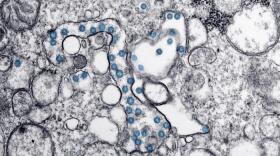As Montana sees a surge in COVID-19 cases, medical facilities, particularly within tribal nations, are being pushed to their limits.
Kaci Wallette is a nurse at the Poplar Community Hospital, a facility in northeast Montana, where a full staff consists of three nurses and three certified nursing assistants.
"If you have a critical patient come in that needs intubated, you're going to have all three nurses in the trauma room. If you have two people come in that are shortness of breath, that's hard to maintain even two with three nurses. So we stabilize them and then we fly them out to magnet hospitals," Wallette said.
The Poplar hospital has 20 beds and no intensive care units (ICUs), like most rural medical facilities. Two weeks ago, Wallette, who is also a councilwoman for the Fort Peck Assiniboine and Sioux Tribes, helped coordinate a critical patient transfer, something that’s become more common and more challenging as COVID cases rise nationwide.
"We were just flying out our 26th patient in that week. We had to call 16 different facilities before we could find an open bed for that person. There was no open beds in North Dakota, none in Montana and none in Wyoming. The patient ultimately ended up going to the University of Salt Lake City," Wallette said.
On Oct. 15 Governor Steve Bullock said medical staff were desperately needed across the state. Local travel nurse databases are exhausted, the National Guard is assisting and hospitals are nearing capacity.
Reservation communities are asking for the majority of assistance as case counts swell with often fatal results. Indigenous people account for 39 percent of Montana COVID-19 deaths, despite making up only about seven percent of the state’s population.
Jim Murphy with the state health department says there are two reasons so many reservation facilities need staff right now.
"You start out with fairly small staff and fairly small facilities, and then you have large case numbers. So you're kind of getting hit from both sides. You might have staffing shortages because some of your staff is literally out ill and you might have staffing shortages because you don't have enough staff to effectively interview all the cases identified or do all the contact tracing needed," Murphy said.
Melissa Hubbard is the Billings Area Director of Quality for Indian Health Service (IHS).
"IHS hospitals...none of them have ICU beds. So when we need to have a person transferred to a higher level of care, we really rely on those referral centers to be able to take the patients. And with all of the uptick of activity in Montana, ICU bed shortages have been a challenge," Hubbard said.
Hubbard says Montana IHS facilities are transferring at least one critical COVID-19 patient each day. She says they haven’t yet been unable to find a transfer, but are making a plan in case Montana’s healthcare system is overwhelmed.
"I don't know that it's likely but it's a possibility," Hubbard said.
Hubbard says Fort Harrison, the Helena Veterans Affairs hospital, has agreed to accommodate critical patients from IHS facilities if IHS can’t find transfers.
Other Montana facilities are also changing to cope with the virus. Hubbard said the Crow Northern Cheyenne hospital is now only treating non critical COVID patients to avoid infecting non COVID patients.
Dr. Bridget Brennan, the chief medical officer of Benefis Health in Great Falls, says with COVID cases surging and flu season ramping up she's concerned about health facility capacity on a regional scale.
"If we get overwhelmed, it's going to gridlock the entire system. We're going to see ICUs that aren't going to have beds for patients that need them," Brennan said.
She urged everyone to stay home to avoid spreading the virus to healthcare workers. On Oct. 16, the state health department reported that five percent of all active Montana COVID-19 cases are individual healthcare workers. Dr. Brennan says medical personnel are getting sick from being in grocery stores, gas stations and restaurants, not from going to work.
"I will put this very simply: We are experiencing a public health crisis," Brennan said.
While reservations across the state have been under varying lockdown and restrictive measures since the spring, Fort Peck Councilwoman Wallette says she doesn’t believe those restrictions can successfully slow the spread of COVID-19 if the rest of the area has reopened.
"Roosevelt County sits in the majority on the Fort Peck Indian reservation, but the town of Wolf Point, they fall under the jurisdiction of Roosevelt County in the state of Montana," Wallette said.
Roosevelt County Attorney Austin Knudsen, who’s running for state attorney general, has questioned the authority of health officials to order quarantines and mask mandates.
"I understand from his point, but from my point, I have to look out for the health and welfare of my enrolled members," Wallette said. "I don't think a tribal lockdown will work until the county is on the same page with us. And it's not fair to have half of the county on lockdown while the other is not. Our numbers are continuing to rise. Our death rate is still rising. It's not working right now."
Copyright 2020 Yellowstone Public Radio






